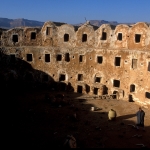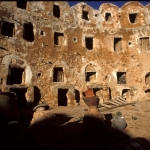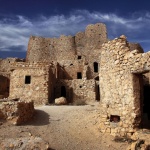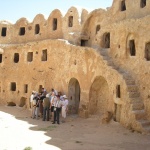Qasr Al-Haj
Qasr Al -Haj means castle, and were originally used to store the local produce such as olive oil, and grains. Each family in the village would have a special designated place. The whole structure is usually circular and has a main entrance gate. It is these castles that bring to mind the statement mentioned by some historians in that the Libyans were the first to invent the banking system, and therefore you are looking at one of the oldest banks in the world. In a way, each one of these rooms has evolved to become a vault in modern banks where wealthy families can deposit their precious valuables for safe keeping. The castle was established in the middle of the 12th century by Shikh A’ebdella Ben Muhammad Ben Hilal Ghanem. The castle contains 114 rooms which is the exact number of the books in the holy Koran. The castle was used as a resting and a meeting point for the pilgrims in their way to the coastal cities and hence its name: Qaser al-H’aj (The Pilgrim’s Castle).
The Berber Qasrs of Jebel Nafusa
Most of the fortified granary stores, known as Qasr date back to the 12th century. There name Qasr meaning castle these structures were rarely used as a from of defence. Instead they were offered protection for the local crops needed for the community?s survival. Constructed from local rock, sun dried mud brick, and gypsum, the cool storage areas, sealed with doors made of palm trunks. It was organised like a modern bank system. Saving and stockpiling preventing the crop holders from squandering their resources. Rooms on the ground floor were used to preserver olive oil. The above-ground rooms customarily housed barley and wheat.




WHO ARE WE
OTHER SERVICES
LIBYA TOURS
CONTACT